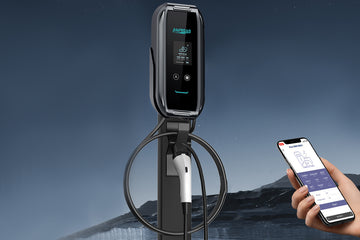
With the growing popularity of electric vehicles (EVs) due to their eco-friendly nature and potential cost savings over time, many homeowners are considering installing an EV charger at home. However, one of the most common questions asked is, "How much does it cost to install an EV charger at home?" The answer to this question is influenced by several factors, such as the type of charger, electrical upgrades needed, and labor costs. In this essay, we will explore these factors and provide an estimate of the potential costs of installing an EV charger at home.
Types of EV Chargers
There are three main types of EV chargers: Level 1, Level 2, and Level 3 (also known as DC Fast Charging). Level 1 chargers are the slowest and can be plugged into a standard household outlet, while Level 2 chargers are faster and require a dedicated circuit with a NEMA 14-50 receptacle. Level 3 chargers are the fastest, but they are typically used for commercial applications due to their high power requirements and cost. For home installations, Level 2 chargers are the most popular choice.
The appropriate charging power varies depending on the car model. It's essential to select a charger that matches your vehicle's power capabilities. More power is not necessarily better— if your car has a maximum input power of 7KW, using a charger with an input power of 22kW will not result in faster charging.
|
EV Model |
Battery Capacity (kWh) |
Maximum Input Power (kW) |
Approximate Driving Range per Hour of Charging (miles) |
Recommended EV Charger |
|
Tesla Model 3 (Long Range) |
75 |
11.5 |
44 |
Tesla Wall Connector or Normal Level 2 Charger (40A) with a J1772 to Tesla adapter |
|
Chevrolet Bolt EV |
66 |
7.2 |
28 |
Level 2 Charger (32A) |
|
Nissan Leaf Plus |
62 |
6.6 |
26 |
Level 2 Charger (32A) |
|
Audi e-tron |
95 |
11 |
34 |
Level 2 Charger (40A) |
|
Jaguar I-PACE |
90 |
7 |
22 |
Level 2 Charger (32A) |
|
Hyundai Kona Electric |
64 |
7.2 |
28 |
Level 2 Charger (32A) |
|
Kia Niro EV |
64 |
7.2 |
28 |
Level 2 Charger (32A) |
|
Porsche Taycan |
93.4 |
19.2 (AC) / 270 (DC) |
60 (AC) / 900 (DC) |
Level 2 Charger (48A) / DC Fast Charger (350A) |
|
Volkswagen ID.4 |
77 |
11 |
34 |
Level 2 Charger (40A) |
|
Ford Mustang Mach-E |
88 (Extended Range) |
11 |
34 |
Level 2 Charger (40A) |
Factors Affecting Installation Costs
Hardware Costs: Level 1 chargers are the most affordable, typically costing $100-$300, while Level 2 chargers range from $300-$1,000, depending on their functionality and brand. There are three widely-used methods for Level 2 charging:
- Plug-and-Play: This is the most straightforward method. Simply plug the charger into the vehicle, and the charging process begins automatically.
- Card-Based Charging: This method provides added security. Charging is initiated by swiping a card, which prevents unauthorized individuals from using the charger.
- App-Controlled Charging: This method offers increased convenience. Charging can be started remotely through a mobile app or a Wi-Fi connection.
Level 3 chargers can cost significantly more and are typically not suitable for home installations.
The AMPROAD iFlow P9 portable EV Charger is a great option for you, for the following reasons:
- It's a 10kW residential EV charger with adjustable support for 10A, 16A, 24A, 32A, and 40A.
- It's a Level 2 EV Charger that can be controlled via a mobile app.
- It's an EV fast charger with a 8AWG 25-foot long cable.
- It comes with a wall-mount bracket and a cable holder, the weighs is about 7kg.
- It's reasonably priced 359.99 usd/pcs and includes free shipping to the US and Canada
Electrical Upgrades: Installing an EV charger may require electrical upgrades, including:
New Circuit and NEMA 14-50 Receptacle Installation: Installing a new dedicated circuit and NEMA 14-50 receptacle for a Level 2 charger 40A can cost around $300-$800.
Service Panel Upgrade: If the home's service panel cannot handle the added load of an EV charger, an upgrade may be needed, costing between $1,000-$3,000. We suggest the main panel should be at leave 200A capacity.
Labor Costs: The cost of professional installation can vary based on factors such as location and complexity. The average costs range from $100-$300.
Permit and Inspection Fees: Local building codes may require permits and inspections, which can add to the cost of installation, ranging from $50-$300.
Incentives and Rebates: Some governments and utilities offer incentives, tax credits, and rebates that can reduce the overall cost of installation. These incentives can vary based on location and program details.
Taken together, the cost of installing an EV charger at home can vary widely depending on factors such as the type of charger, electrical upgrades needed, labor costs, and local incentives. Homeowners should consult with a licensed electrician or a professional EV charger installer to get an accurate estimate based on their specific circumstances. By considering all the factors that affect installation costs, homeowners can make an informed decision and enjoy the convenience of charging their EVs at home.


